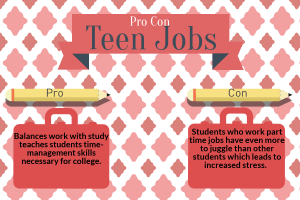Pro:
March 19, 2018
For a high school student with a rigorous course-load, a spot on a varsity sports team and involvement in other extracurriculars, working a part-time job may seem impossible. However, having a job is a valuable experience that can teach teenagers many skills they will need to succeed after high school.
Whether a part-time job year-round or just a summer job at an ice cream shop or a summer camp, students should seek out a job at some point during high school in order to improve their work ethic, time management and communication skills.
Senior Kaelyn Padgett has had a job at Panera Bread since the spring of 2016, and said that having a job has given her time and money management skills. Padgett works once a week every Saturday, which she said works best for her amount of schoolwork.
“I think that [having a job] teaches you responsibility, and the importance of being able to balance two different things, like having a job and balancing your schoolwork,” Padgett said. “It’s nice to have your own money to pay for things and not have to rely on your parents so much so it kind of teaches you independence as well.”
According to a 2010 National Institutes of Health (NIH) article on advantages and disadvantages of adolescent employment, working consistently, but not too much where it interferes with school, teaches students time-management skills necessary for college. While college-bound teenagers can benefit from having a part-time job, students planning to go straight to the workforce can gain experience early on from a job.
“It gives them experience. I find that my children have learned a lot working at various jobs,” said RHS parent Martha Wagner, whose four children have all had jobs in high school. “[Jobs help with] learning about what you don’t want to do a�� some jobs the kid hates and knows they don’t want to do that in the future.”
While jobs can be beneficial for those who seek them out and are able to realistically balance them with school commitments, some students who are obligated to work to provide for their family may be overworked. Additionally, different employers have different expectations of how often employees work.
To mitigate these concerns, there are many federal regulations placed on minors to regulate hours and conditions that they work under, such as a limit of hours worked per week and not during school hours for minors under 16 years old, according to the U.S. Department of Labor.
While having a job may seem at times unenjoyable or hard to manage, it provides valuable experience with time and money management, as well as experience dealing with different types of people that will prove beneficial later in life. If even just during the summer, it is important that adolescents seek out employment before graduating high school.




